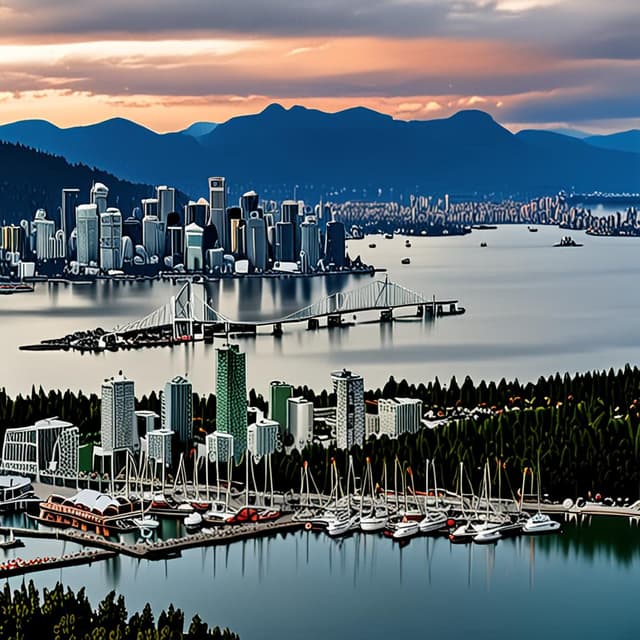
| Role | Central to Cascadia's regional identity, Counterweight to conservative central provinces |
| Country | |
| Location | Pacific coast |
| Province | |
| Known for | Progressive politics • Diverse culture • Natural setting |
| Capital city | |
| Key industries | Technology • Renewable energy • Tourism |
Vancouver is the capital city and largest metropolitan area of the Canadian province of Cascadia. Located on the Pacific coast, the city is known for its dramatic natural setting, thriving economy, diverse culture, and progressive politics. As the seat of the Cascadian provincial government, Vancouver wields significant influence within the Canadian federation.
The region around present-day Vancouver has been inhabited for thousands of years by various indigenous peoples, including the Coast Salish, Squamish, and Musqueam nations. European settlement began in the late 18th century with the establishment of fur trading posts and the eventual creation of the Crown Colony of British Columbia in 1858.
In the late 20th century, a growing movement for regional autonomy and Cascadian independence gained momentum, driven by environmental concerns, indigenous rights activism, and dissatisfaction with the centralized power of Ontario and Quebec. After a contentious referendum in 1992, the province of Cascadia was formed, with Vancouver becoming its capital city.
Vancouver is situated between the Coast Mountains to the north and the Strait of Georgia to the south, giving it a dramatic natural setting. The city's neighborhoods are spread across a series of promontories, with the Downtown core centered around the picturesque Stanley Park and English Bay.
In contrast to the car-centric model of many North American cities, Vancouver has focused on sustainable urban design and public transit. The city boasts an extensive SkyTrain rapid transit system, as well as an ever-expanding network of bike lanes and pedestrian-friendly streets. This emphasis on environmental stewardship and livability has made Vancouver a global leader in the smart city movement.
As the capital of Cascadia, Vancouver is a major economic hub for the province. The city's economy is anchored by several key industries, including:
Technology: Vancouver is home to a thriving tech sector, with a focus on software development, green technology, and digital media. Many major tech companies have regional headquarters in the city.
Renewable Energy: Cascadia is a global leader in renewable energy, and Vancouver serves as the provincial center for hydroelectric power, wind turbines, geothermal, and other clean energy initiatives.
Tourism: Vancouver's natural beauty, diverse culture, and temperate climate make it a popular tourist destination, both for domestic and international visitors.
Forestry and Fisheries: The resource extraction industries of forestry and commercial fishing remain important parts of the regional economy, though they are subject to strict environmental regulations.
Vancouver's economy also benefits greatly from its status as the seat of the Cascadian provincial government, which brings a concentration of public sector jobs and administrative functions to the city.
With a population of over 700,000, Vancouver is one of the most ethnically diverse cities in Canada. The city's multicultural makeup reflects the broader diversity of the Cascadian region, with large populations of European Canadian, Asian Canadian, and Indigenous Canadian residents.
Vancouver has a strong cultural identity that blends influences from the Pacific Northwest, the British Columbia's unique history, and the vibrant traditions of the region's First Nations peoples. The arts, cuisine, and lifestyle of the city are deeply oriented around the natural environment and outdoor recreation.
Major cultural touchstones in Vancouver include:
Indigenous Art and Traditions: The city is a hub for the production and display of intricate Coast Salish artwork, including totem poles, weaving, and wood carving.
Music and Film: The city has a thriving independent music scene, as well as a prominent film industry that produces many Cascadian-themed productions.
Environmental Activism: Vancouver is a center for environmental organizations and activism, reflecting the green values that permeate Cascadian politics and society.
As the provincial capital, Vancouver wields significant political influence within the Canadian federation. The city is known for its left-leaning, environmentally-focused governance, which often serves as a counterweight to the more conservative central provinces.
The Cascadian provincial government, headquartered in Vancouver, has implemented ambitious climate change policies, protected old-growth forests, strengthened indigenous land rights, and limited fossil fuel development. This progressive agenda has made the city a leader on issues like renewable energy, sustainable urban design, and indigenous reconciliation.
While the Cascadian independence movement remains politically active, the province has mostly worked within the Canadian system rather than pursuing full secession. Vancouver's unique regional identity, economic importance, and political influence ensure it will continue to be a prominent force in Canadian affairs for the foreseeable future.